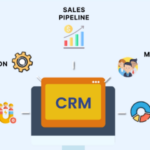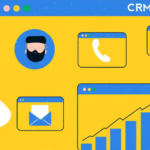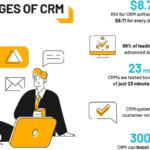Using a CRM Strategy Helps a Company Grow
A CRM system is a strategy for growth – not just an app to keep your employees on task. If you have a CRM strategy in place, you’ve prepared to set up your team for success and, therefore, increase customer satisfaction. Here’s how it works:

Learn the basics of a CRM system
A Customer Relationship Management (CRM) system strengthens the interconnected processes between management, staff, and customers. The goal of any business is to financially thrive by providing their customers with a needed service or product. Managing your inventory means you are less likely to run out of a popular product and avoids the frustration of customers who can either wait for you to obtain more of the product or go to one of your competitors.
Even something as simple as scheduling is easier in a CRM system. Your CRM administrator can make the staff schedule from anywhere with a cloud-based CRM application. All essential personnel will have access to the schedule; should there be questions, a communication feature connects staff to the scheduler.
Different CRM systems focus on various different aspects of what makes most companies function. When these functions are automated, processes are in place to keep operations running smoothly. Sales e-mails for particular actions are sent immediately, notifications for technician arrival are sent to waiting customers, etc. Reports are run for inventory, work progress, and other essential real-time company information to make it easier for managers to reduce administrative tasks and direct time and attention to customer relationship research. With that extra time, owners and managers are able to focus their energy toward developing new deals and packages to offer your ideal customers what they want resulting in consistent, long-term business.
A CRM platform monitors a customer’s experience with your company.
A CRM monitors a customer’s actions and in actions which is vital data to achieving repeat business. If a promotional e-mail went unopened, but, a social media ad was followed and a product purchased, this customer’s purchasing history is recorded in order to refine targeted ads for products and services.
Additionally, all interactions with the customer, from phone consults to notes from work visits and e-mail requests, are maintained in a CRM database. Aside from the fact this enables service technicians or customer service professionals a history of discussion to avoid repeating information the customer has already given, it demonstrates a pattern of behavior making it easier to anticipate a customer’s needs. Most people pick their brands because a company has bothered somehow to empower them and make them feel valuable. A CRM system makes providing this feeling easily accessible.
A CRM system that is cloud-based can be used after hours.
Business owners rarely have the luxury of working 9-5. Owners and managers take on numerous tasks while trying to live their lives. If a work task needs to be completed, but, another task overtook the time during the day it could have been completed, a cloud-based CRM system would allow for after hours work to be accomplished.
Cloud-based CRM systems operate online rather than relying on a physical, company server. This means you can design your own schedule according to how it best fits into your life with access to all your essential work information and documentation available at the tap of a screen or the click of a mouse. A CRM after hours is available on desktop or app for handheld devices.
CRM administrators can easily keep track of employees, inventory, and progress on projects.
A strong CRM system may come with a GPS function which will save your CRM administrator a significant amount of time. It will be clear when company equipment and vehicles have left headquarters and the ETA for any given worker in the field is quickly estimated in real-time. A CRM administrator has access to reports on inventory and can easily recommend to management which products are bringing in profits and which are wasting shelf space. Seeing where corners can be cut more easily saves money in the long run – a CRM strategy can go a long way towards helping a company grow.
Choosing a CRM strategy helps a company grow from year to year.
With improved internal processes and the potential for increased customer satisfaction, a CRM strategy could very well help a small business grow. An effective implementation of a new cloud-based CRM could mean the difference in a profitable year and throwing in the towel. Automated tasks free up time to make customers feel like they matter. If a business has a product that makes customers feel important, they are more likely to succeed.
A CRM system needs to be a good fit for a business. Often un-needed features cause high pricing and confusion for field staff. If the interface isn’t user friendly and common tasks aren’t easily accessible for employees, it’s likely to go unused. Choosing a CRM system to fit the needs of your business may require several demonstrations, CRM software trials and feedback meetings with employees.
CRM Runner offers a 30-day trial to help companies experience what happens when an easy-to-use CRM system is put in place. Start learning how your customers behave and how you can better retain your loyal base: Check out the features and start a free trial with by signing up here.






1 Comments